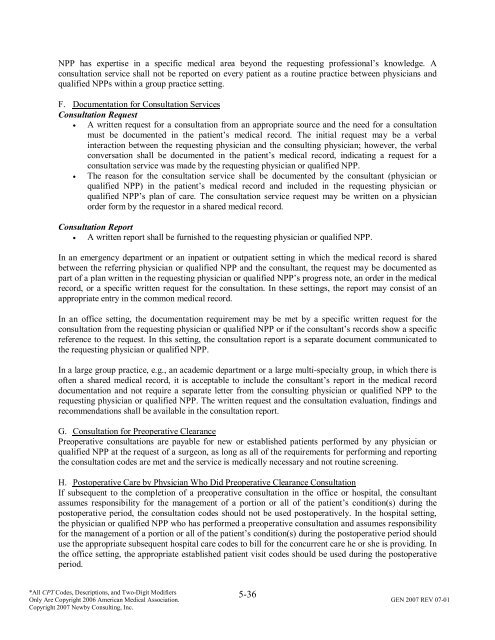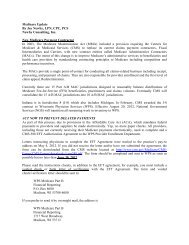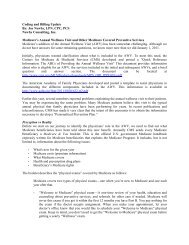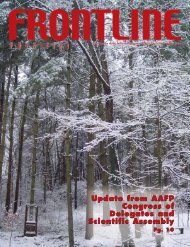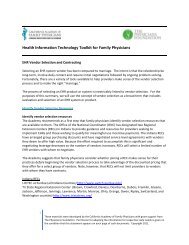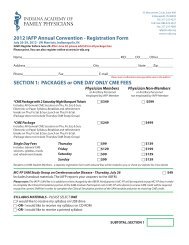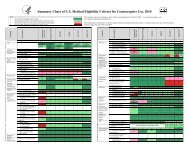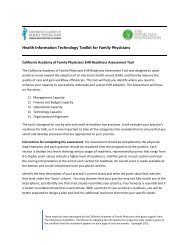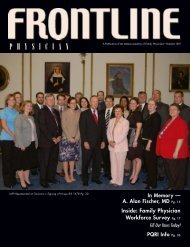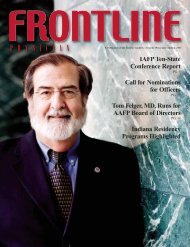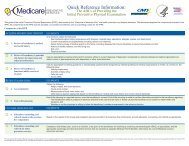pqri measure coding and reporting principles - Indiana Academy of ...
pqri measure coding and reporting principles - Indiana Academy of ...
pqri measure coding and reporting principles - Indiana Academy of ...
You also want an ePaper? Increase the reach of your titles
YUMPU automatically turns print PDFs into web optimized ePapers that Google loves.
NPP has expertise in a specific medical area beyond the requesting pr<strong>of</strong>essional’s knowledge. A<br />
consultation service shall not be reported on every patient as a routine practice between physicians <strong>and</strong><br />
qualified NPPs within a group practice setting.<br />
F. Documentation for Consultation Services<br />
Consultation Request<br />
• A written request for a consultation from an appropriate source <strong>and</strong> the need for a consultation<br />
must be documented in the patient’s medical record. The initial request may be a verbal<br />
interaction between the requesting physician <strong>and</strong> the consulting physician; however, the verbal<br />
conversation shall be documented in the patient’s medical record, indicating a request for a<br />
consultation service was made by the requesting physician or qualified NPP.<br />
• The reason for the consultation service shall be documented by the consultant (physician or<br />
qualified NPP) in the patient’s medical record <strong>and</strong> included in the requesting physician or<br />
qualified NPP’s plan <strong>of</strong> care. The consultation service request may be written on a physician<br />
order form by the requestor in a shared medical record.<br />
Consultation Report<br />
• A written report shall be furnished to the requesting physician or qualified NPP.<br />
In an emergency department or an inpatient or outpatient setting in which the medical record is shared<br />
between the referring physician or qualified NPP <strong>and</strong> the consultant, the request may be documented as<br />
part <strong>of</strong> a plan written in the requesting physician or qualified NPP’s progress note, an order in the medical<br />
record, or a specific written request for the consultation. In these settings, the report may consist <strong>of</strong> an<br />
appropriate entry in the common medical record.<br />
In an <strong>of</strong>fice setting, the documentation requirement may be met by a specific written request for the<br />
consultation from the requesting physician or qualified NPP or if the consultant’s records show a specific<br />
reference to the request. In this setting, the consultation report is a separate document communicated to<br />
the requesting physician or qualified NPP.<br />
In a large group practice, e.g., an academic department or a large multi-specialty group, in which there is<br />
<strong>of</strong>ten a shared medical record, it is acceptable to include the consultant’s report in the medical record<br />
documentation <strong>and</strong> not require a separate letter from the consulting physician or qualified NPP to the<br />
requesting physician or qualified NPP. The written request <strong>and</strong> the consultation evaluation, findings <strong>and</strong><br />
recommendations shall be available in the consultation report.<br />
G. Consultation for Preoperative Clearance<br />
Preoperative consultations are payable for new or established patients performed by any physician or<br />
qualified NPP at the request <strong>of</strong> a surgeon, as long as all <strong>of</strong> the requirements for performing <strong>and</strong> <strong>reporting</strong><br />
the consultation codes are met <strong>and</strong> the service is medically necessary <strong>and</strong> not routine screening.<br />
H. Postoperative Care by Physician Who Did Preoperative Clearance Consultation<br />
If subsequent to the completion <strong>of</strong> a preoperative consultation in the <strong>of</strong>fice or hospital, the consultant<br />
assumes responsibility for the management <strong>of</strong> a portion or all <strong>of</strong> the patient’s condition(s) during the<br />
postoperative period, the consultation codes should not be used postoperatively. In the hospital setting,<br />
the physician or qualified NPP who has performed a preoperative consultation <strong>and</strong> assumes responsibility<br />
for the management <strong>of</strong> a portion or all <strong>of</strong> the patient’s condition(s) during the postoperative period should<br />
use the appropriate subsequent hospital care codes to bill for the concurrent care he or she is providing. In<br />
the <strong>of</strong>fice setting, the appropriate established patient visit codes should be used during the postoperative<br />
period.<br />
5-36<br />
*All CPT Codes, Descriptions, <strong>and</strong> Two-Digit Modifiers<br />
Only Are Copyright 2006 American Medical Association. GEN 2007 REV 07-01<br />
Copyright 2007 Newby Consulting, Inc.


